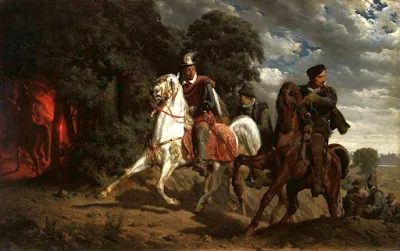Henry III, King of France and Poland
On 19 September 1551, Henry was born at the royal castle of Fontainebleau in
France.
Family
He was the fourth son of King Henry II of France and Catherine de'Medici.
His paternal grandparents were King Francis I of France and Claude of France.
His maternal grandparents were Lorenzo de' Medici, Duke of Urbino and
Madeleine de la Tour d'Auverge.
His older brothers were Francis II of France; Charles IX of France and
Louis of Valois.
Henry was a member of the royal house of Valois-Angoulême. He was raised
under the supervision of Diane de Poitiers.
Childhood & Youth
Henry II. Unlike his father and his elder brothers, he had little interest in the
traditional Valois pastimes such as hunting and physical exercise. He
preferred the arts and reading.
favourites known as the mignons.
Love & Marriage
Queen Elizabeth I of England. Elizabeth was then almost 37 years old
and many parties in her country expected that she should marry to
produce an heir. However nothing came of these discussions. Henry
was a Catholic and Elizabeth a Protestant ...
younger than her). He called her an "old creature with a sore leg".
In the autumn of 1573, Henry would meet Louis of Lorraine. They
married on 15 February 1575. They had not any children together.
French Wars of the Religion
He took part in the victories over the Huguenots at the Battle of Jarnac
in March 1569 and the Battle of Moncontour in October 1569. He also
helped to plot the St. Bartholomew's Day Massacre of 1572, though he
did not participate directly.
6 June 1573.
King of Poland and Grand Duke of Lithuania
July 1572, Jean de Monluc was sent as the French envoy to Poland to
negotiate the election of Henry to the Polish throne in exchange for
military support against Russia and diplomatic assistance in dealing
with the Ottoman Empire.
monarch of the Polish Lithuanian Commonwealth. A Polish delegation
went to meet Henry.
Poland. On 21 February, Henry's coronation was held in Kraków.
by several Polish practices and disappointed by the rural poverty and the
harsh climate of the country.
becoming first King of Poland and later King of France on the Feast of
Pentecost. The Order would retain its prestige until the end of the French
monarchy.
King of France
Cathedral.
to the Huguenots. His action resulted in the formation of the
Catholic League by Henry I, Duke of Guise.
at the Castle of Château de Blois. There royal guardsmen murdered the Duke.
The Duke was very popular in France and the citizens turned against Henry.
Assassination
was preparing to attack Paris.
Clément was killed on the spot by the guards.
wounds.
postponed. Inside the city there was a great joy.
the last of the Valois Kings.






Comments